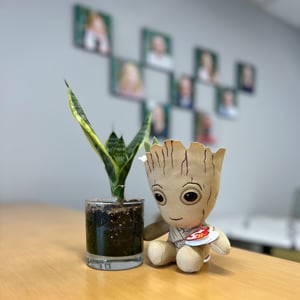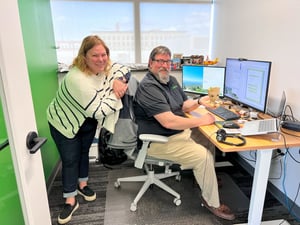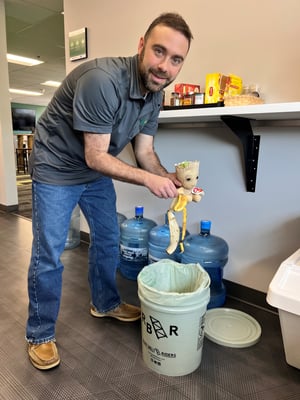Emerald Built Environments is a sustainability consulting firm. We work on large construction projects (new, renovations, all building types) to help them achieve sustainability goals. We also work with companies and organizations with portfolios to help them develop strategies for operational sustainability and to improve existing building efficiency and performance.
Guided by the core values of Constantly Raising the Bar, Eye of the Tiger, Cultivate the Team, Environmental Stewardship, and Owning Our Outcomes, our team shows up every day to deliver results that are leading to a more sustainable future. At work, we celebrate our success, measured by the number of sustainable environments we’ve touched (1,491 as of the publication of this blog post), CO2 reductions and reduced embodied carbon emissions of our projects, water efficiency, and sustainable design principles such as biophilia, indoor air quality, and daylight and views. Clients across America and around the globe seek out our team to help them achieve their goals. But what does the Emerald team do when we aren’t at work? We Groot.
Groot is Great
 Groot is the mascot for our core value of Environmental Stewardship, which is defined as “Genuine care for the environment and the opportunity for change.” Each Monday when our team gathers for our weekly huddle, we do our core value shout-outs, and Groot, for a time, was the most overlooked core value at Emerald. He would just sit on our conference table and was not celebrated.
Groot is the mascot for our core value of Environmental Stewardship, which is defined as “Genuine care for the environment and the opportunity for change.” Each Monday when our team gathers for our weekly huddle, we do our core value shout-outs, and Groot, for a time, was the most overlooked core value at Emerald. He would just sit on our conference table and was not celebrated.
We of course enjoy celebrating our professional achievements--like when we achieve LEED Gold certification on the largest mass timber building in the U.S., or when one of our projects issues its first embodied carbon report, or when we help a building owner select an affordable and highly efficient HVAC system. At times, above-and-beyond moments like these for our clients often feel like standard operating procedure.
But now, we not only celebrate the wins for our clients, but we've really taken to heart celebrating our own personal sustainability achievements. And that's where Groot comes in. Groot now has his own channel in Teams. Titled, “I am Groot,” the idea came from Joe Minerd, who reminded us that our personal actions matter too. Now, we celebrate what we do at home. Each week, Groot circulates the office, residing with a different employee (for 1 week) who most demonstrates living this core value among our team. And we would love to share our Groot wins with you! Let’s consider some of the activities the Emerald team is working on when not at work.
Growing Our Own Food
One of the most impactful things you can do to be more sustainable is to grow your own food. Not only does this reduce your carbon footprint by reducing the transportation required to get your food to your plate, but it also helps to support biodiversity and reduce the use of harmful pesticides and fertilizers. Even if you don't have a large backyard, you can still grow herbs, vegetables, and fruits in containers on your balcony or windowsill. If you are like Dwayne Petko, you may also be growing livestock at home.
Purchase LOCALLY-PRODUCED Food
If you can't grow all your own food, another way to support sustainability is to purchase locally-produced food. This helps to support local farmers, reduces the transportation required to get your food to your plate, and ensures that your food is fresher and more nutritious.
 Look for farmer's markets, food co-ops, and community-supported agriculture programs in your area to find local, sustainable food options. If you are like Matt Setzekorn, your family’s meal prep program may include purchasing local food and also helping to reduce food waste by prepping and freezing it in advance. Or, if you are like Ward Miller and have access to a grove of olive trees, you might make the most amazing locally-produced olive oil and share it with your teammates!
Look for farmer's markets, food co-ops, and community-supported agriculture programs in your area to find local, sustainable food options. If you are like Matt Setzekorn, your family’s meal prep program may include purchasing local food and also helping to reduce food waste by prepping and freezing it in advance. Or, if you are like Ward Miller and have access to a grove of olive trees, you might make the most amazing locally-produced olive oil and share it with your teammates!
Compost
 We do this at the office through Rustbelt Riders, and several have the service at home too. (Everyone can bring their compost to the office if they don’t have the service at home.) Composting is a great way to reduce food waste and create nutrient-rich soil for your garden. Instead of throwing your food scraps in the trash, set up a compost bin or pile in your backyard. You can compost fruit and vegetable scraps, coffee grounds, eggshells, and more. Just make sure to avoid composting meat, dairy, and oils, as these can attract pests and slow down the composting process. Michael Fodor’s family has diverted 925 lbs. of food waste through composting and Groot Channel founder Joe Minerd also composts in his garden with yard waste.
We do this at the office through Rustbelt Riders, and several have the service at home too. (Everyone can bring their compost to the office if they don’t have the service at home.) Composting is a great way to reduce food waste and create nutrient-rich soil for your garden. Instead of throwing your food scraps in the trash, set up a compost bin or pile in your backyard. You can compost fruit and vegetable scraps, coffee grounds, eggshells, and more. Just make sure to avoid composting meat, dairy, and oils, as these can attract pests and slow down the composting process. Michael Fodor’s family has diverted 925 lbs. of food waste through composting and Groot Channel founder Joe Minerd also composts in his garden with yard waste.
Donate Clothing and Household Items for Reuse
Instead of throwing away your old clothing and household items, consider donating them to a local thrift store or charity. This not only helps to reduce waste, but it also gives these items a second life and supports those in need. Plus, you may even be able to get a tax deduction for your donations. If you are like me and have kids who are transitioning to another stage of life, it's time to clear out the closets and donate for reuse.
Sustainable Wedding Planning
If you're planning a wedding, there are many ways to make it more sustainable. Choose a venue that is easily accessible by public transportation or encourage carpooling. Use sustainable materials for decorations, such as recycled paper or natural materials like flowers and greenery. Serve locally sourced, organic food and drinks, and choose a caterer who uses reusable or compostable dishes and utensils. Finally, consider donating leftover food to a local shelter or food bank to reduce waste. If you are like Hannah Coones, your wedding selection involves leveraging natural views in lieu of extensive decorations.
Remodeling with Sustainable Materials
If you're planning a home remodeling project, consider using sustainable materials. This can include materials like bamboo, cork, and reclaimed wood for flooring, countertops, and cabinetry. You can also use low-VOC paints and finishes to reduce indoor air pollution. Finally, make sure to properly dispose of any construction waste by recycling or donating it to a local reuse center. If you are like Sophia Hestad, and your kitchen is undergoing renovation, you wait until the Energy Star refrigerator is ready and you select the same finish materials required for the projects we support at work.
As time draws us closer to 2030 and the global commitment to reduce emissions by 50%, there are many things we can do individually to contribute to the planet’s health. Each action builds upon the last and leads to a more sustainable future. We are your team. Groot with us!
Posts by Tag
- Sustainability (173)
- sustainability consulting (146)
- Energy Efficiency (129)
- Utilities (93)
- LEED (88)
- Sustainable Design (69)
- green building certification (60)
- energy audit (48)
- ESG (46)
- construction (43)
- GHG Emissions (37)
- WELL (32)
- carbon neutrality (32)
- tax incentives (28)
- net zero (27)
- costs (26)
- energy modeling (19)
- electric vehicles (17)
- Energy Star (14)
- Housing (14)
- Inflation Reduction Act (13)
- water efficiency (13)
- Social Equity (12)
- decarbonization (12)
- diversity (10)
- NGBS (7)
- fitwel (7)
- Earth Day (6)
- Engineering (5)
- electrification (5)
- mass timber (5)
- non-profit (5)
- retro-commissioning (5)
- Emerald Gives (4)
- News Releases (4)
- B Corp (3)
- COVID-19 Certification (3)
- Customers (3)
- EcoVadis (3)
- Indoor Air Quality (3)
- PACE (3)
- Arc (2)
- DEI (2)
- EcoDistricts (2)
- Green Globes (2)
- cannabis (2)
- CDP (1)
- SITES (1)
- furniture (1)
- opportunity zone (1)
- womenleaders (1)

